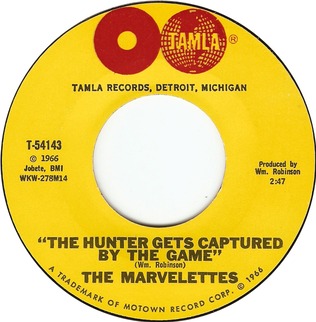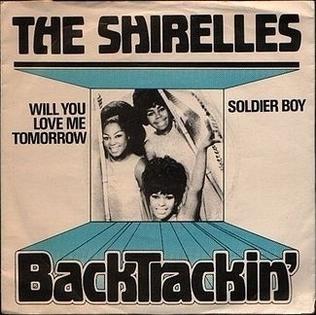
Grace Beverly Jones is a Jamaican singer, songwriter, model and actress. Born in Jamaica, she and her family moved to Syracuse, New York, when she was a teenager. Jones began her modelling career in New York state, then in Paris, working for fashion houses such as Yves St. Laurent and Kenzo, and appearing on the covers of Elle and Vogue. She notably worked with photographers such as Jean-Paul Goude, Helmut Newton, Guy Bourdin, and Hans Feurer, and became known for her distinctive androgynous appearance and bold features.

Eartha Mae Kitt was an American singer and actress known for her highly distinctive singing style and her 1953 recordings of "C'est si bon" and the Christmas novelty song "Santa Baby".

Jacques Morali was a French disco and dance music record producer and songwriter, known for creating acts like The Ritchie Family and Village People.

"Love Will Save the Day" is a song recorded by American singer Whitney Houston from her second diamond studio album Whitney (1987). The song was released in May 1988 by Arista Records as the album's fifth single. The song did not have a music video but was still successful, climbing into the US top ten. Written by Toni C and produced by John "Jellybean" Benitez, it is one of the uptempo singles on the album that also includes "I Wanna Dance with Somebody" and "So Emotional".
"You'll Never Know", sometimes referred to as "You'll Never Know (Just How Much I Love You)" in later years, is a popular song with music written by Harry Warren and the lyrics by Mack Gordon. The song is based on a poem written by a young Oklahoma war bride named Dorothy Fern Norris.

"The Hunter Gets Captured by the Game" is a 1966 song written by Smokey Robinson. It was a hit single in 1967 for the American girl group The Marvelettes for the Motown label, from their self-titled album released that same year.

"Turn the Beat Around" is a disco song written by Gerald Jackson and Peter Jackson, and performed by American actress and singer Vicki Sue Robinson in 1976, originally appearing on her debut album, Never Gonna Let You Go (1976). Released as a single, the song went to #10 on the Billboard pop charts, and #73 on the Billboard soul chart. The song earned Robinson a Grammy nomination for Best Female Pop Vocal Performance. The track also went to number one on the Billboard disco chart for four weeks. "Turn the Beat Around" is considered a disco classic and is featured on many compilation albums.

"Will You Love Me Tomorrow", sometimes known as "Will You Still Love Me Tomorrow", is a song written by Gerry Goffin and Carole King. It was first recorded in 1960 by the Shirelles; released as a single that November, it became the first song by an African-American girl group to top the Billboard Hot 100 chart. It has since been recorded by many other artists, including King on her 1971 album Tapestry.

Slave to the Rhythm is the seventh studio album by Jamaican singer Grace Jones, released on 28 October 1985 by Island Records. Subtitled a biography in the liner notes, Slave to the Rhythm is a concept album, produced by ZTT Records founder and producer Trevor Horn, that went on to become one of Jones' most commercially successful albums and spawned her biggest hit, "Slave to the Rhythm".

Portfolio is the debut studio album by Jamaican singer and songwriter Grace Jones, released in 1977 by Island Records. It spawned her first big hit, "La Vie en rose".

Fame is the second studio album by Grace Jones, released on 7 June 1978 by Island Records.

Warm Leatherette is the fourth studio album by Jamaican singer Grace Jones, released on 9 May 1980 by Island Records. The album features contributions from the reggae production duo Sly and Robbie and is a departure from Jones's earlier disco sound, moving towards a new wave-reggae direction.

"Disco Inferno" is a song by American disco band the Trammps from their 1976 studio album of same name. With two other cuts by the group, it reached No. 1 on the US Billboard Dance Club Songs chart in early 1977, but had limited mainstream success until 1978, after being included on the soundtrack to the 1977 film Saturday Night Fever, when a re-release hit number eleven on the Billboard Hot 100 chart.

"I Need a Man" is the debut single by Grace Jones, released in 1975 through Beam Junction. It was re-released in 1977, and reached number 83 on the US Billboard Hot 100 and topped the US Dance Club Songs chart.

Grace Jones' discography consists of 10 studio albums, eight compilation albums and 53 singles.

"Where Is My Man" is a song from 1983 by the American singer and actress Eartha Kitt, which appeared on her 1984 album I Love Men. The song was co-written by comedy writer Bruce Vilanch along with musicians and producers Fred Zarr and Jacques Morali.
This article contains the discography of American singer Eartha Kitt.
"Run Baby Run" is a song performed by French singer Amanda Lear from her second album Sweet Revenge, released as a single in 1978 by Ariola Records.

"Non illuderti mai" is a song by Italian singer Orietta Berti, released as a single in April 1968 for the summer festival Un disco per l'estate. The song came in second place at the festival behind "Luglio" by Riccardo Del Turco. It has notably been covered in English as "My Little Lady" by the Tremeloes and in French as "Ma bonne étoile" by Joe Dassin.

"Comme un garçon" is a song by Sylvie Vartan from her 1967 album Comme un garçon. It was also released on an EP and as a single.

















